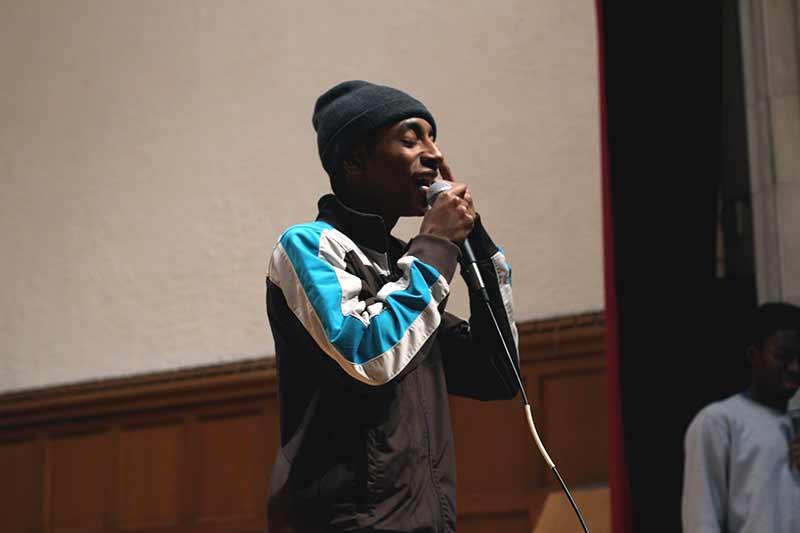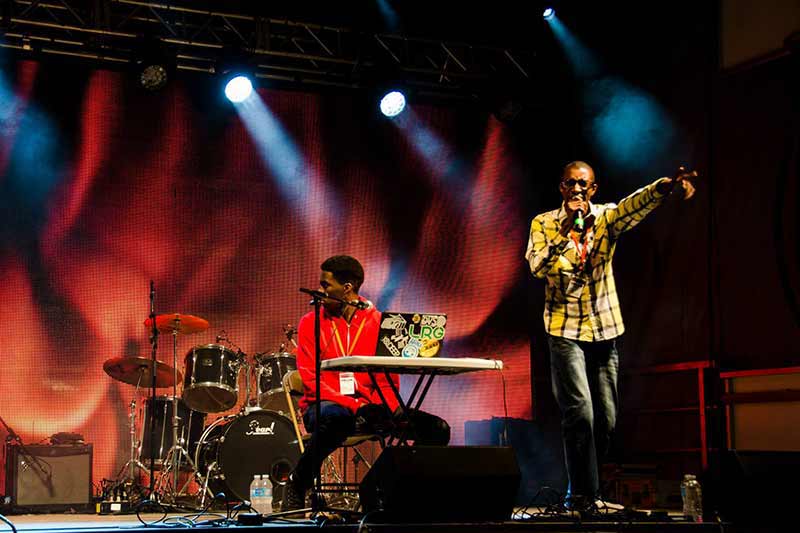Jordan Heywood, known to his fans as Orijin, is one of the Toronto area’s strongest up-and-coming emcees. A tight flow, great sense of humour, and strong songwriting abilities separate him from the chaff and make him somebody worth keeping an eye on. He sat down with us to talk about where he came from, what he’s loving in hop right now, and what it’s like to be a recording artist in the age of streaming.
Tell me about how you got where you are now. That’s an excellent question. Through a slow, very organic process of building a network who encouraged and supported me and my gifts for making music, and recording music. People would give me opportunities to perform at venues like school, church talent shows, and public fundraisers.
So over the course of doing that for five years, I reached a particular season where I crossed paths with a producer, Jeremy Rodney-Hall, who was just on the same wavelength musically and spiritually. We connected, worked together to create an album, continuing along that same organic process. We just did shows that our friends invited us to, and more friends invited us to that.
Eventually, Jermaine Wall came into the picture, and he had the heart to bring his marketing prowess and management skills to support artists. So the three of us together now launched the label called LSTNFND, and really continuing to value those relational connections we’ve formed with churches, campus groups, and people in the hip hop community. And that’s my long-winded answer.
That is the shortest answer to that question I’ve ever gotten. (Both laughing.) When did you start rapping? I started rapping in 2009, and I’m aging myself as a baby right now, but I was grade twelve writer’s craft class when I started writing poetry for the first time. Just had a couple teachers who really encouraged us to keep a journal, just to put down whatever creative ideas might come to mind on the day to day.
And because, at the time, I was listening to a lot of hip hop and digging deeper and deeper into conscious hip hop — artists like Nas, Common, The Roots, the good stuff, you know… Because I was listening to a lot of that at the time, it seemed like the most natural inclinations for me to try to write in that style, instead of writing Shakespearean type poetry. So that was how it started, with a cool assignment just to keep a journal.
So cool. Do you still keep a journal? Yeah! I tend to just call it my rhyme book, or most often it will take the format of Google Docs on my phone. Still a journal in a sense, but yeah, all the time, even if I don’t have my paper notepad on me. I put down ideas as they come to me, words or phrases that have an intriguing rhythm, conversations that I have, yeah — I definitely continue to write in that same kind of pattern.
That’s very cool. So you’ve got this new record, a mixtape called Re:Percussions. Thirteen tracks, twenty-five minutes, I think, something really short like that? Twenty-four, to be precise! (Both laughing.)
You’ve really stepped up your game. It is really good. Tell me how it came together; when did you start working on this? Thank you! I appreciate that a lot. Oh my gosh, this is such a difficult question to answer because of my writing style. I will just write a bunch of songs until I start to see a theme, or until I have enough compiled to begin to piece things together as a project. So some of the songs on it I started writing more than a year ago, but more of the concrete structure and planning for the album itself started happening since September of 2015, I’d say. Even since then, it’s gone through a bunch of iterations.
Initially, it was going to be a twenty-plus track mixtape. Half of the project was going to be remixes of old songs, and the other half would be some newer, really short tracks that would just kinda blend in together and give a snapshot of my discography and where I’m at now. We realized it was not necessarily too big of an undertaking, but given the timeline we had set for ourselves and a bunch of logistical things, it made sense to shorten it, really focus in on the new material, and do that well.
And the benefit of that too is now you have the opportunity to have two records you could pack a bunch of remixes from and release your own take on a stress-free sort of untitled:unmastered deal. Exactly, yeah.
So the burning question on my mind, though, is how did Shad end up on this mixtape? (Laughing). That’s a great question. So I’ve had some interaction with him over the last two years. His shoutout on this mixtape was through our mutual buddy, John Corbin, who’s the A&R for LSTNFND and a longtime friend of Shad’s. And he made the request and asked if Shad wanted to do a twenty-second shoutout.
But Shad’s been one of my favourite artists for years and years. When I started writing, Shad was right in there. I once went to a Shad concert and brought an article about him from the Toronto Sun that I wanted to get signed. (Both laugh.) Yep. Total fanboy. So yeah, I approached him just to get his autograph on that. A couple months prior to that concert though, I had found him on Facebook through a mutual friend, and sent him a message saying “Hey! You’re a huge inspiration to me. I’m starting to explore emceeing myself, love your style, and here’s a clip of me rapping on Youtube.” (Both laughing again.)
So fast forward again, I’m getting his autograph, and he’s like “Hey! You’re Jordan from Facebook! What’s up?” (Hysterical laughter ensues.) So total starstruck type of moment. He sent me a couple more messages, gave me some feedback on my project, and he actually invited me to perform at a show he was curating during Canadian Music Week in 2012. So that was our initial interaction!
Wow. Yeah! So it’s been a few years since we’d connected in a meaningful way, but I’m on his radar, and obviously he’s on mine.
We always want to move people in two ways. Firstly, we want them to move their heads and their feet, and secondly, we want to move them to ask deeper questions.
Man, that’s a super cool story. Rad. On the topic of rad hip hop, your music has these delightful old-school vibes. What inspires you to make these beats? Who are you listening to? A lot of my influences are those soulful, lyrical, kind of real emcees: Black Thought from The Roots, Jurassic 5 — and just like the fun they have. You ever listen to their music?
Yeah man. Just their production and their whole style. A guy like Charlie Tuna who has this weird kinda voice just sounds so playful. I love that kind of hip hop that communicates how joyful somebody is about making it. So I want to communicate that tone. But it also really excites me when I can string together syllables or flows that just surprise people, or maybe they don’t think you can rhyme eleven syllables together. I love playing with technique and stretching myself in that way. But I’m kinda straying from the question here.
No way, straying is good. Let’s stray. The other key element for me, of course, is being free to express what’s on my mind, which are things of the Kingdom of God. So being able to bring out my faith in my music is a high value. I take an example from cats like Theory Hazit, Bizzle, Stephen the Levite is amazing — he does all those things I just mentioned really well. These guys catch a lot of flak because they’re at the top of the Christian Hip Hop game, but Lecrae and Andy Mineo, I appreciate a lot of the music that those guys create.
Lecrae’s awesome. Yeah, yeah. And then there’s Toronto hip hop, man, I could go on, cats I appreciate. I like hip hop that is fun, with some soul to it you can feel, and stuff that really pushes the envelope in terms of technique.
That actually brings me to my next question. You’re all about your faith, and I know you’re completely different from even a lot of Christian hip hop artists in that you and your label have a mission. Tell me more about this. So my mission is, through the music, to present my own spiritual journey and convictions in a transparent way that I think, or that I hope, invites people to see that there is depth to a person’s genuine walk with Christ. That there is joy to be found in that, freedom to be found in that. That it’s not a constrictive religious routine or dogma that Christ calls us to.
So I try to use my music as a gateway to invite them to ask more questions about what a life with Christ looks like. You can check out what our goals are verbatim on LSTNFND’s website, but it’s to present the message and the hope of Christ through music that moves people to reflect on where they’re at in their own spiritual journey. Everybody’s on one, whether they think about it daily or not.
We always want to move people in two ways. Firstly, we want them to move their heads and their feet, and secondly, we want to move them to ask deeper questions about life, who God is to them, who they are in this world, and hopefully they hit us up on Facebook and talk to us after shows. We get to pray with people, we get to connect, and point people in some small way towards their next step.
Very cool. So much of current hip hop is running the other direction from the sort of music you make. What do you think of the trends in hip hop these days? Kendrick is killing the game.
I love the jazz game he’s got going on. Yeah, man! Absolutely. I really like the fact that hip hop is making people uncomfortable. What I mean is, you have artists like Kendrick, who have found this very clever way of waking the line between commercial success and challenging the very system and culture that gives him his platform. It’s so interesting to see the way he cuts so deep into issues of racial identity and racism in the States. You know, he’s got criticisms of hip hop culture in and of itself.
And how weird is it that he’s got somebody like Dre backing him? The very progenitor of the culture as it is. Yeah! I think it’s a great thing that hip hop music is stirring people to have conversations about the music they’re listening to, or about those deeper issues. I find it interesting we’re seeing what could be called conscious hip hop kinda break through into the mainstream, but I also appreciate the out of the box creativity that Childish Gambino and Chance the Rapper and guys like that bring to the table.
It seems to me like music is going through a giant cultural shift. Between streaming, which degrades the value of music, and stuff like Soundcloud, which lets us change our music after it’s been released. How do you deal with all this as a recording artist? I’ve got a nine to five. (Both laughing.) I’m going back to school man!
Yeah, it’s such an interesting thing, because I value purchasing music from artists I appreciate. I’ve got a whole growing stack of CDs. So I have a vast appreciation for that. But I have to recognize that the majority of people who listen to our music and appreciate it, they just don’t have the same habits in regards to how they interact with content and pay for it. So part of our philosophy in LSTNFND is that we want to reduce as many barriers as possible for people to access our music, so we do make use of Soundcloud and Youtube to upload all of our music. Every single one of our releases, for free, so people can stream it.
We posted the last album, In Good Hands, on iTunes. It’s also on Basecamp. We recently started using a super cool website called Gumroad, which is great for physical and digital sales. We still do a lot of t-shirts and different kinds of march, but for most people, the entry point they have will be streaming it and listening for free.
And this makes sense. When I’m purchasing an album — and the last album I purchased was Leon Bridges’ latest — before I decide to invest and commit, I’m gonna want to know a bit of what it sounds like and feel like I know one or two of these songs decently before I pick it up. So it makes sense to me that people will want to stream and to access things on demand.
And I think also, because we have a shorter attention span, thanks very much to Facebook and Twitter and Snapchat and things like that, it’s hard for younger folks in this generation to sit down and take in a full album. So you’ll have a few tracks you like and put them on a playlist and scrap the rest. The culture of music listening and playback is definitely changing to become on demand.
And that does affect, in some ways, my and my team’s approach to creating music, and how we structure our releases. So now we’re trying to be on a more consistent schedule of just releasing one single, or one video of a free verse or something. And we aim for a biweekly basis. Just to have a remix or single, something where people can consistently get a taste of something, because we recognize releasing a full album is not always… Particularly, we want to be smart about how we release how much we release, and that it’s going to received well.
One last thing I’ll say: we tend to do projects with fewer tracks. In Good Hands had nine tracks. The album before that had eight. This new mixtape has thirteen, which is really more like ten or eleven, and a couple skits. So this kind of demand changes how we market ourselves.
Hip hop was always bad for those hour and a half long records though. The most common refrain from critics was that the albums were too long, and they said that about everybody. So keeping it short might be overdue. This new mixtape, man. Twenty-three minutes and fifty-seven seconds! It’s short. It’s digestible. There’s energy flowing throughout the whole time. Even the slightest thing, like just having a series of drops and shoutouts, we chopped them all down and edited them just to make sure listeners wouldn’t find them to be lulls.
So if you love hip hop, you could throw on Re:Percussions and listen to it four times in the amount of time it would take to listen to the new Drake record. (Both laughing.) Wait, is that a benefit or not?
What influence do you want to have? I’ll be honest and say I’m still trying to figure that out. I haven’t thought much about the impact I want to have on the industry. I’ve thought more about, how can I be faithful with the gift and the opportunities set before me this year? It’s hard to see past that kind of a timeline.
This year, that means working hard to complete another album, doing a tour this spring and summer, and continuing to tap into the support that has been coming through in the hip hop community and in the faith community to have the music heard by as many people as possible.
A new album and a tour before the end of the year — you’re busy! And I’m going back to school part time this year to get my master’s. Thankfully part time, because I do want to have time to spend on these creative pursuits. Suffice it to say that taking over the industry right now is not something I’m prioritizing. I want to continue creating music that makes people move and smile, and that’s one commitment — among others — that I’ll be doing in the next year.
Okay man. Last question. It’s a doozy though. All right, bring it.
What was your favourite record last year? Oh! (He cheats and opens iTunes.) You know what, I was gonna say Gregory Porter, because I just caught on to him, but I’m way late to the bandwagon because his last album came out in 2013. In any case, I will give it to the homie JGiven’s Fly Exam. In terms of brilliant hip hop, on multiple levels, he’s in another league in my books. He really knows how to tell stories. His lyrical technique, his delivery, he’s very unique — he’ll make you think and he’ll make you move, which are two things that are important to me.


